
GIVE THIS RAMADAN
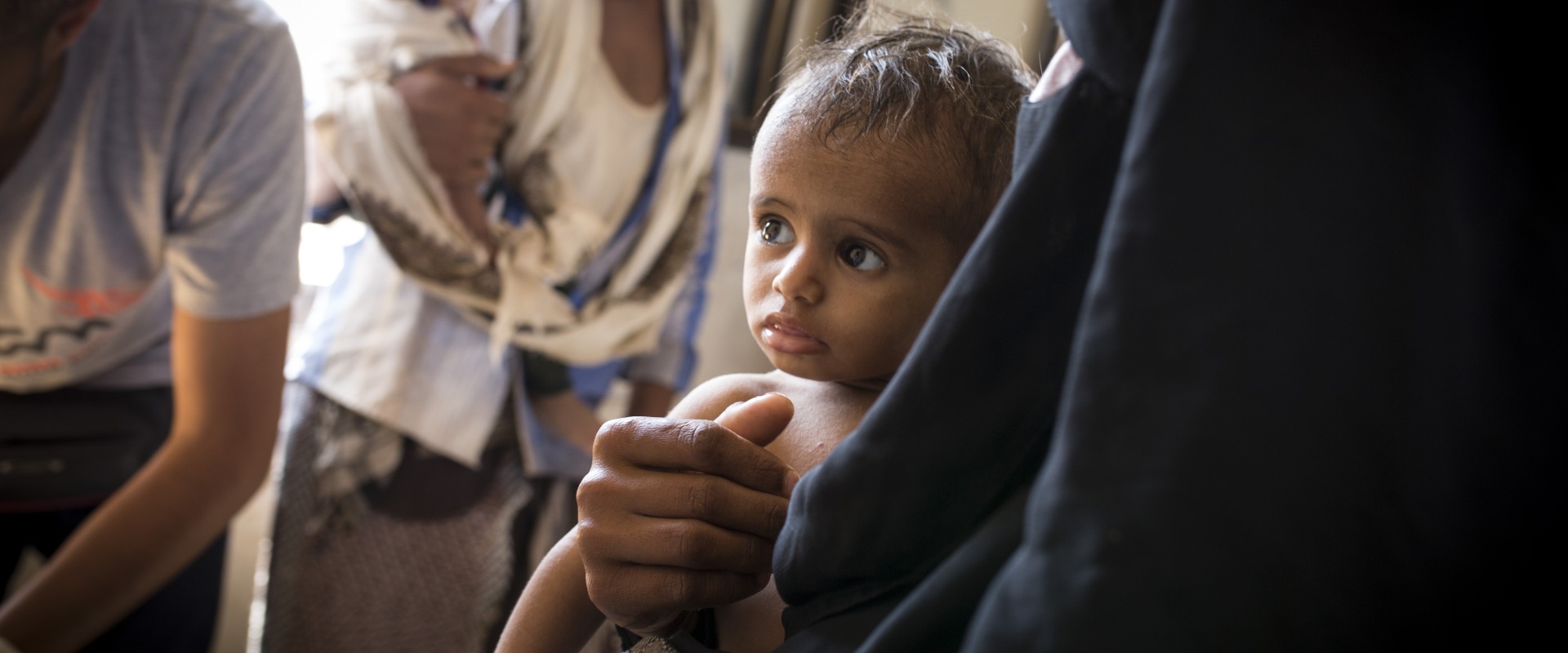
In Action Against Hunger’s health centers, mothers and fathers long for their children to have food, school, and security.
Even before the war in Yemen began more than eight years ago, the country was the poorest in the Middle East. Today, as conflict continues, hunger and poverty are rampant, and millions of families have been displaced. Yemen’s youngest citizens were born into a country at war. They are children who have never known peace—or had enough to eat.
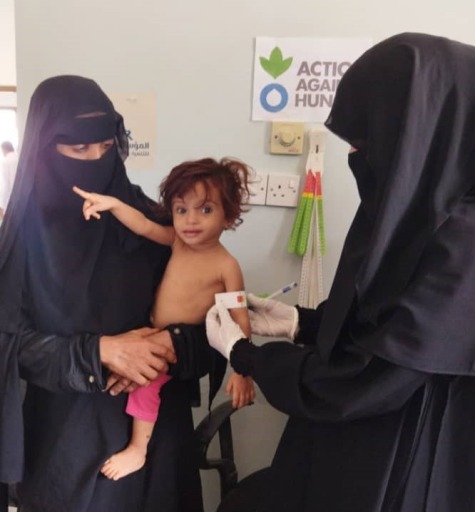
At just one year old, Roidaa is too young to know what a life without conflict is like, but her mother remembers. Their life before the war was not easy, she says, but they had ways to cope—they had jobs with regular salaries, education, health, and security. Food was more available and affordable, and they did not worry that their lives were in danger.
When the war came, it changed everything. “My work stopped,” says Rodiaa’s mother. Without income, the family plunged into poverty. Roidaa suffered without enough food or health services. She began to show signs of malnutrition, her mother took her to a health center run by Action Against Hunger for treatment. Still, every day is a struggle.
“We face difficulties in getting clean water and we are not able to buy medicine, so we have become at risk of hunger and diseases,” says Rodiaa’s mother.
An estimated 23.4 million people in Yemen need humanitarian assistance to meet their basic needs. Essential public services, including health, nutrition, water, hygiene, and sanitation services, have been severely limited in Yemen since the war began. Combined with high levels of food insecurity, the country’s hunger crisis is dire, and outbreaks of cholera and other diseases are common.
Rodiaa’s story is far too common. Children across the country struggle every day to survive severe food insecurity. Zakia, for example, another one-year-old child treated by Action Against Hunger, also suffered from acute malnutrition—a life-threatening condition—before receiving treatment.
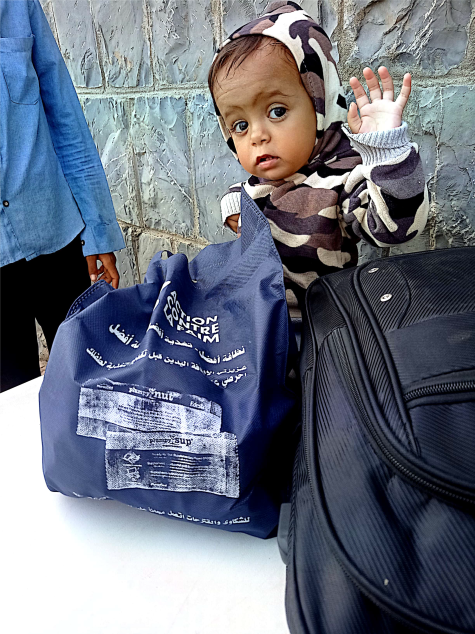
Before the war, Zakia’s father was a farmer. “The farm allowed me to get money and food. I could provide for my family,” he recalls. “When the war started and the impacts of bombing hit our village, we left everything, and we tried to rescue ourselves. We did not know where we could find a safe place.”
In 2016, the violence reached their village and forced them to flee for safety. Since leaving home, the family has not had enough income to buy enough food or meet other basic needs. Until recently, they also struggled to find healthcare.
“There is no health unit near our village, and we do not have money to travel to a hospital with our sick children,” says Zakia’s father. “We used to stand, full of sorrow, unable to do anything.”
Sadly, they are not alone: across Yemen, 18 million people lack access to basic health services and only half of health facilities are fully operational. Nearly 82% of districts are in urgent need of health assistance. The needs are even greater for women and children, as only 20% of health facilities can provide integrated services for mothers and children. These health facilities face frequent stock-outs of medical supplies and medicines and a lack of qualified medical personnel.
When Zakia fell sick, her father was desperate for help. He learned of a new health facility opened by Action Against Hunger, and took his little girl there, where she diagnosed with acute malnutrition.
Zakia was treated and has since recovered. With their youngest child healthy again, her family can once more think about the future. Zakia’s father wishes for an end to the war, so his children can access enough food and get an education. He dreams of a future when they can “get back to their village and live peacefully.”
Yemen’s economy, which was extremely fragile before the war, has collapsed. The economic crisis has exacerbated a hunger crisis, with limited domestic food supplies, a declining currency value, and rising prices of fuel and imports. As a result, 20 million people cannot buy or produce enough to eat.
Asmaa’s family had always been poor, but they managed to eat well and afford school for their children before the war. Her father remembers health, education, safety, and security. When he lost his income, it pushed his family deep into crisis.
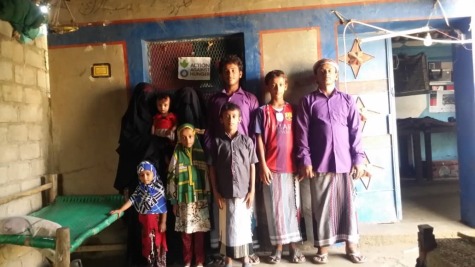
“At times, I work for a daily wage. Sometimes, I have to resort to borrowing and going in debt,” says Asmaa’s father. His family struggles to access enough food. At times, they only eat just one meal a day, and it often does not enough variety or nutritional value to meet their daily needs.
“We did not get [many] fruits and vegetables, because of the high prices and the high cost of living resulting from the war,” says Asmaa’s dad. Asmaa suffered from hunger as a result. “Before Action Against Hunger began supporting the health facilities in [our] district, health and nutrition services were unavailable and difficult to obtain. We heard about the organization’s intervention, so we took Asmaa to the health facility.”
At the facility, a health worker quickly diagnosed Asmaa with malnutrition, and her case was severe enough to need inpatient treatment at a hospital. Knowing how little they could afford, Action Against Hunger provided Asmaa’s parents with a transportation stipend to help them get to the hospital. Once she recovered, Asmaa returned home to her family. our team followed up and checked on her every week until she was fully cured.
“The smile of my baby girl is back and she’s playing like the rest of her siblings with a good health after we had lost hope,” says her father. He wants peace so his children can be safe, well-fed, and educated.
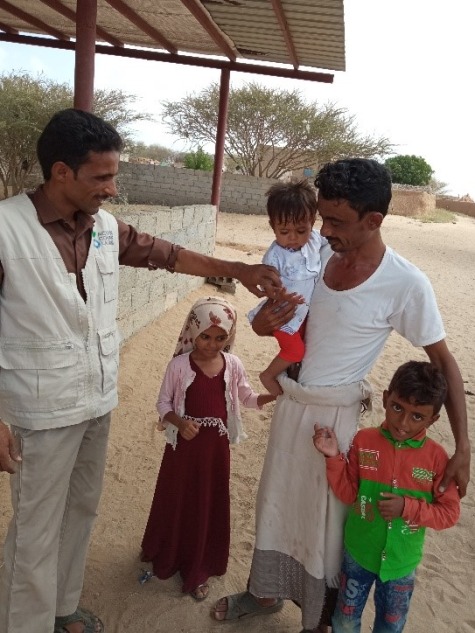
Action Against Hunger has been working in Yemen since 2013. Since the war began, our teams have focused on helping internally displaced people and vulnerable host communities. Maintaining an operational presence in the country’s hardest-hit areas and supporting people in difficult-to-reach communities remain our greatest challenges.
Action Against Hunger’s nutrition and health programs in Hodeida, Hajjah, Abyan, and Lahj treat women who are breastfeeding and young children who suffer from moderate and severe acute malnutrition. Our teams also train health workers to provide quality care in communities and facilities and educate communities in practices to promote health, hygiene, and nutrition. We also work to improve access to water, hygiene, and sanitation, repair and rebuild water points and latrines, and provide essential hygiene supplies.
Last year, we helped more than 200,000 people in Yemen. The families we support all have one thing in common—they dream of a peaceful, brighter future for their country. As one child’s parents told us: “If the war stops, everything will be provided for our children.”
Join our community of supporters passionate about ending world hunger.